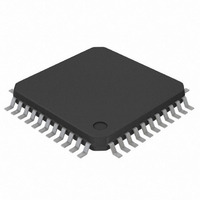PIC16F877-20I/PT Microchip Technology, PIC16F877-20I/PT Datasheet - Page 320

PIC16F877-20I/PT
Manufacturer Part Number
PIC16F877-20I/PT
Description
IC MCU FLASH 8KX14 EE 44TQFP
Manufacturer
Microchip Technology
Series
PIC® 16Fr
Datasheets
1.PIC16F616T-ISL.pdf
(8 pages)
2.PIC16F688T-ISL.pdf
(688 pages)
3.PIC16C770-ISO.pdf
(8 pages)
4.PIC16F873-04SO.pdf
(218 pages)
5.PIC16F873-04SO.pdf
(5 pages)
6.PIC16F873-04SO.pdf
(5 pages)
Specifications of PIC16F877-20I/PT
Program Memory Type
FLASH
Program Memory Size
14KB (8K x 14)
Package / Case
44-TQFP, 44-VQFP
Core Processor
PIC
Core Size
8-Bit
Speed
20MHz
Connectivity
I²C, SPI, UART/USART
Peripherals
Brown-out Detect/Reset, POR, PWM, WDT
Number Of I /o
33
Eeprom Size
256 x 8
Ram Size
368 x 8
Voltage - Supply (vcc/vdd)
4 V ~ 5.5 V
Data Converters
A/D 8x10b
Oscillator Type
External
Operating Temperature
-40°C ~ 85°C
Processor Series
PIC16F
Core
PIC
Data Bus Width
8 bit
Data Ram Size
368 B
Interface Type
MSSP/PSP/USART
Maximum Clock Frequency
20 MHz
Number Of Programmable I/os
33
Number Of Timers
3
Operating Supply Voltage
2 V to 5.5 V
Maximum Operating Temperature
+ 85 C
Mounting Style
SMD/SMT
3rd Party Development Tools
52715-96, 52716-328, 52717-734
Development Tools By Supplier
PG164130, DV164035, DV244005, DV164005, PG164120, ICE2000, DM163022, DV164120
Minimum Operating Temperature
- 40 C
On-chip Adc
8-ch x 10-bit
Lead Free Status / RoHS Status
Lead free / RoHS Compliant
For Use With
XLT44PT3 - SOCKET TRAN ICE 44MQFP/TQFPAC164305 - MODULE SKT FOR PM3 44TQFP444-1001 - DEMO BOARD FOR PICMICRO MCUAC164020 - MODULE SKT PROMATEII 44TQFP
Lead Free Status / Rohs Status
Lead free / RoHS Compliant
Available stocks
Company
Part Number
Manufacturer
Quantity
Price
Company:
Part Number:
PIC16F877-20I/PT
Manufacturer:
DREAM
Quantity:
5 140
Company:
Part Number:
PIC16F877-20I/PT
Manufacturer:
Microchip Technology
Quantity:
10 000
Part Number:
PIC16F877-20I/PT
Manufacturer:
MIT
Quantity:
20 000
- PIC16F616T-ISL PDF datasheet
- PIC16F688T-ISL PDF datasheet #2
- PIC16C770-ISO PDF datasheet #3
- PIC16F873-04SO PDF datasheet #4
- PIC16F873-04SO PDF datasheet #5
- PIC16F873-04SO PDF datasheet #6
- Current page: 320 of 688
- Download datasheet (3Mb)
PICmicro MID-RANGE MCU FAMILY
17.4.13
17.4.13.1 WCOL Status Flag
DS31017A-page 17-44
Acknowledge Sequence Timing
An acknowledge sequence is enabled by setting the acknowledge sequence enable bit, ACKEN
(SSPCON2<4>). When this bit is set, the SCL pin is pulled low and the contents of the acknowl-
edge data bit is presented on the SDA pin. If the user wishes to generate an acknowledge, then
the ACKDT bit should be cleared. If not, the user should set the ACKDT bit before starting an
acknowledge sequence. The baud rate generator then counts for one rollover period (T
the SCL pin is de-asserted (pulled high). When the SCL pin is sampled high (clock arbitration),
the baud rate generator counts for T
ACKEN bit is automatically cleared, the baud rate generator is turned off, and the SSP module
then goes into IDLE mode
If the user writes the SSPBUF when an acknowledge sequence is in progress, then WCOL is set
and the contents of the buffer are unchanged (the write doesn’t occur).
Figure 17-29: Acknowledge Sequence Waveform
SSPIF
Acknowledge sequence starts here,
SDA
SCL
Note: T
Set SSPIF at the end
of receive
BRG
= one baud rate generator period.
ACKEN = 1, ACKDT = 0
Write to SSPCON2
(Figure
Preliminary
8
D0
17-29).
BRG
. The SCL pin is then pulled low. Following this, the
Cleared in
software
T
BRG
ACK
T
BRG
9
Set SSPIF at the end
of acknowledge sequence
ACKEN automatically cleared
1997 Microchip Technology Inc.
Cleared in
software
BRG
), and
Related parts for PIC16F877-20I/PT
Image
Part Number
Description
Manufacturer
Datasheet
Request
R

Part Number:
Description:
Manufacturer:
Microchip Technology Inc.
Datasheet:

Part Number:
Description:
IC MCU FLASH 8KX14 EE 40DIP
Manufacturer:
Microchip Technology
Datasheet:

Part Number:
Description:
IC MCU FLASH 8KX14 EE 40DIP
Manufacturer:
Microchip Technology
Datasheet:

Part Number:
Description:
IC MCU FLASH 8KX14 EE 40DIP
Manufacturer:
Microchip Technology
Datasheet:

Part Number:
Description:
IC MCU FLASH 8KX14 EE 40DIP
Manufacturer:
Microchip Technology
Datasheet:

Part Number:
Description:
IC MCU FLASH 8KX14 EE 44PLCC
Manufacturer:
Microchip Technology
Datasheet:

Part Number:
Description:
IC MCU FLASH 8KX14 EE 44TQFP
Manufacturer:
Microchip Technology
Datasheet:

Part Number:
Description:
IC MCU FLASH 8KX14 EE 44TQFP
Manufacturer:
Microchip Technology
Datasheet:

Part Number:
Description:
IC MCU FLASH 8KX14 EE 44PLCC
Manufacturer:
Microchip Technology
Datasheet:

Part Number:
Description:
IC MCU FLASH 8KX14 EE 44TQFP
Manufacturer:
Microchip Technology
Datasheet:

Part Number:
Description:
IC MCU FLASH 8KX14 EE 44-MQFP
Manufacturer:
Microchip Technology
Datasheet:

Part Number:
Description:
IC MCU FLASH 8KX14 EE 44-MQFP
Manufacturer:
Microchip Technology
Datasheet:

Part Number:
Description:
IC MCU FLASH 8KX14 EE 44TQFP
Manufacturer:
Microchip Technology
Datasheet:

Part Number:
Description:
IC MCU FLASH 8KX14 EE 44PLCC
Manufacturer:
Microchip Technology
Datasheet:











